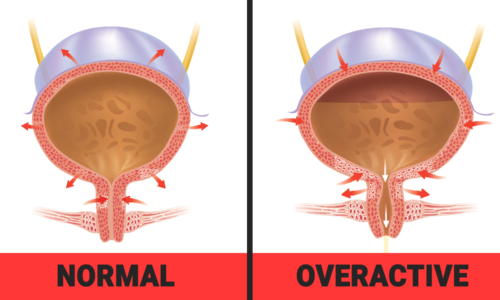Overactive Bladder
Overactive bladder causes a sudden urge to urinate. The urge may be difficult to stop, and overactive bladder may lead to the involuntary loss of urine (urge incontinence).
If you have an overactive bladder, you may feel embarrassed, isolate yourself, or limit your work and social life. The good news is that a brief evaluation can determine whether there’s a specific cause for your overactive bladder symptoms.

Management of overactive bladder often begins with behavioural strategies, such as fluid schedules, timed voiding and bladder-holding techniques using your pelvic floor. If these initial efforts don’t help enough with your overactive bladder symptoms, medications are available.
When to see a doctor?
Although it’s not uncommon among older adults, overactive bladder isn’t a normal part of ageing. If your symptoms distress you or disrupt your life, talk to your doctor. Treatments are available that might help you.
Discussing such a private matter with your doctor might not be easy, but it’s worthwhile to take that risk — especially if your symptoms disrupt your work schedule, social interactions and everyday activities.
Causes
Normal bladder function
The kidneys produce urine, which drains into your bladder. When you urinate, urine passes from your bladder through an opening at the bottom and flows out a tube called the urethra (u-REE-thruh). As your bladder fills, nerve signals sent to your brain eventually trigger the need to urinate. When you urinate, nerve signals coordinate the relaxation of the pelvic floor muscles and the muscles of the urethra (urinary sphincter muscles). The muscles of the bladder tighten (contract), pushing the urine out.
- Neurological disorders, such as stroke and multiple sclerosis
- Diabetes
- Medications that cause a rapid increase in urine production or require that you take them with lots of fluids
- Abnormalities in the bladder, such as tumours or bladder stones
- Factors that obstruct bladder outflow — enlarged prostate, constipation or previous operations to treat other forms of incontinence
- Excess consumption of caffeine or alcohol
- Declining cognitive function due to ageing, which may make it more difficult for your bladder to understand the signals it receives from your brain
- Difficulty walking, which can lead to bladder urgency if you’re unable to get to the bathroom quickly
Overactive bladder causes a sudden urge to urinate. The urge may be difficult to stop, and overactive bladder may lead to the involuntary loss of urine (urge incontinence).
The work-up will likely include a:
- Medical history(voiding diary)
- Physical exam, focusing on your abdomen and genitals
- Urine sample to test for infection, traces of blood or other abnormalities
- Focused neurological exam that may identify sensory problems or abnormal reflexes
- Ultrasonography KUB with post void residual urine volume measurement
- Urodynamic study
Treatment includes Behavioral interventions, Pelvic floor muscle exercises, medications like anticholinergic, Intradetrusor BOTOX injection is given for resistant OAB, Nerve stimulation, Surgery to increase bladder capacity.
FAQs
WHAT IS UROLOGY?
Urology is a surgical speciality that addresses male and female diseases of the urinary tract, as well as male reproductive system disorders. Urology is a part of health care that deals with diseases of the male and female urinary tract (kidneys, ureters, bladder and urethra). It also deals with the male organs that are able to make babies (penis, testes, scrotum, prostate, etc.). Since health problems in these body parts can happen to everyone, urologic health is important.
WHAT CAN I DO TO MAINTAIN GOOD UROLOGIC HEALTH ?
The best way to avoid urological problems is to maintain good overall health habits, including exercising regularly, maintaining a healthy weight and avoiding tobacco, excessive alcohol, and caffeine.You should also avoid foods or substances that remove water from the body, known as diuretics.
THERE’S BLOOD IN MY URINE. WHAT MAY BE THE CAUSE?
The presence of blood in the urine could be the result of a minor cause or a serious underlying medical condition. To determine the source, a urologist will perform a thorough evaluation. The blood could be the result of an infection, kidney or bladder stones, cancer of the urinary system, or injury.
IT’S PAINFUL TO URINATE. WHAT COULD BE CAUSING THE PROBLEM?
There are many conditions that could result in painful urination. An infection of the urinary tract or prostate is a common cause, along with obstructions in the urethra, kidney, bladder, or prostate.